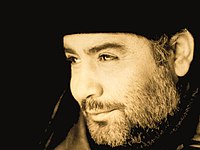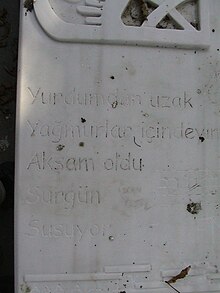Ahmet Kaya
Ahmet Kaya (born October 28, 1957 in Malatya ; † November 16, 2000 in Paris ) was a Kurdish - Turkish singer and composer of the Özgün Müzik .
Life
His father Mahmut Kaya was a textile worker and a Kurd from the village of Yağızatlı in Çelikhan ( Adıyaman Province ), who moved to Malatya at a young age. His mother Zekiye Genç was Turkish from Erzurum . Ahmet Kaya was the last child to be born and grew up in poor conditions. His father gave him a baglama ( saz ) when he was six years old . After his father retired, the family moved to Istanbul in 1972. Ahmet Kaya could not get used to the big city and went to Cologne with his uncle , but then returned to Turkey after 1.5 years . He had no school education and among other things worked as a taxi driver.
In Istanbul he came into contact with left-wing clubs. When he recited poetry at a memorial service for Nâzım Hikmet in 1977 , he was sentenced to 5 months in prison. After the prison he was drafted into the army. During his military service he was a member of a music band. After completing his military service, he married Emine Başa in 1979, with whom he had a daughter, but the two separated a year later; Ahmet Kaya's father died in the same year. Together with Hasan Hüseyin Demirel, Ahmet Kaya brought out his first music cassette Ağlama Bebeğim in 1985 . In the same year he published his second work Acılara Tutunmak . It reached its artistic peak in the mid-1980s and early 1990s. He wrote the score for the film Tatar Ramazan for his friend, the actor Kadir İnanır . Ahmet Kaya Gülten later married Hayaloğlu. Gülten Hayaloğlu's brother Yusuf Hayaloğlu wrote many songs for Ahmet Kaya, but later both ended their collaboration because of differences of opinion.
February 10, 1999
In 1999 Ahmet Kaya declared at a gala of the Gazetecileri Derneği magazine , at which he was to be recognized as a “state artist” of Turkey, that he would also accept the award in the name of the Saturday mothers , to whom he dedicated a song, that he was of Kurdish origin and intend to sing a Kurdish song in his upcoming album, which he also wants to make a video for. He was booed and whistled for by Turkish celebrities.
Ahmet Kaya tried to defend himself with the following sentence:
“Ben bin yıldır bir arada yaşayan Türk ve Kürt halklarının kardeş olduğunu, binlerce yıl daha bir arada yaşayacağına ve yaşaması rektiğine inandığımı her yerde söyledim. "Biz bu ülkeyi böldürtmeyeceğiz de söyledim." ”
“I announced everywhere and always that I believe that Turks and Kurds will live together peacefully for a thousand years, and that this will continue for thousands of years. But I also said for a long time: 'We will never separate this country'. ""
The Turkish singer Ebru Gündeş then pelted him with a knife and fork. Serdar Ortaç , who performed after Ahmet Kaya's award ceremony, sang a modified version of one of his songs as a protest against the singer, in which he had included the following sentences:
Another Turkish celebrity, Şenay Düdek , insulted Ahmet Kaya as "Sünnetsiz pezevenk" (uncircumcised pimp). After marches like 10th Yıl Marşı were played, Ahmet Kaya and his wife, protected by a few people, left the event in a panic.
He faced up to 12 years in prison for his speech that evening. He left Turkey in 1999 after a press campaign against him and a few death threats.
Life in exile
His life in exile was marked by depression and loneliness; he was in a country ( France ) that was completely alien to him. He promised his fans that he would soon come back to Turkey with a new album and he also wrote a collection of poems. However, both were not published until after his death.
In European exile, he mainly performed in front of Kurdish audiences and gave concerts at cultural festivities. His last report was broadcast on the Kurdish channel MEDYA TV . Ahmet Kaya died of a heart attack in Paris in 2000 and was buried in the Père Lachaise cemetery. Many people attended the funeral and the Kurdish singer Şivan Perwer sang the song Agirî in Kaya's honor . His grave is in the same cemetery where Yılmaz Güney and many other famous personalities such as Jim Morrison and Oscar Wilde rest.
Posthumously
The Turkish AKP government made several attempts to rehabilitate Ahmet Kaya and, among other things, was considering transferring his body to Turkey in 2009. The award of a highly decorated award (Cumhurbaşkanlığı Kültür ve Sanat Büyük Ödülleri) by the Turkish President Abdullah Gül at the end of October 2013 was a further step. Protests against this award came mainly from the nationalist MHP . At the same time, the association Magazin Gazetecileri Derneği announced the foundation of an Ahmet Kaya Prize in 2012.
music
Ahmet Kaya belonged to the generation of the 1970s whose life was shaped by civil war-like conflicts between right and left groups in Turkey. He himself was a communist and a Marxist . In Turkey in the 1980s, his convictions brought him into conflict with state power on several occasions. He took a clear position on social grievances, especially in the Kurdish south-east of Turkey, and always praised the Marxist-Leninist ideology as an element of liberation. The lyrics, which are often politically influenced, have high lyrical values and are often about the close relationship with his mother. The deep and at the same time soft, melancholy voice of Ahmet Kaya was one of his trademarks.
Published albums
According to his website, Ahmet Kaya has released the following albums:
- Ağlama Bebeğim (Don't cry my child) (1985)
- Acılara Tutunmak ( Eng . To hold on to pain) (1985)
- Şafak Türküsü (German Twilight Song ) (1986)
- An Gelir (The moment is coming) (1986)
- Yorgun Demokratie (exhausted democrat) (1987)
- Başkaldırıyorum ( Eng . I resist (literally: I raise my head)) (1988)
- Resitaller-1 (German Concerts 1) (1989)
- İyimser Bir Gül ( Eng . An Optimistic Rose) (1989)
- Resitaller-2 (German Concerts 2) (1990)
- Sevgi Duvarı (German Wall of Love) (1990)
- Başım Belada ( Eng . I am in trouble) (1991)
- Dokunma Yanarsın ( Eng . Don't Touch, You're Burning) (1992)
- Tedirgin ( Eng . Troubled) (1993)
- Şarkılarım Dağlara ( Eng . My songs in the mountains) (1994)
- Koçero (with Selda Bağcan) (German nomad) (1994)
- Beni Bul (Eng. Find Me) (1995)
- Yıldızlar ve Yakamoz ( Eng . The Stars and the Sea Shine ) (1996)
- Dosta Düşmana Karşı (German against friend and foe) (1998)
- Hoşçakalın Gözüm (German Farewell to my loved ones) (2001)
- Biraz da Sen Ağla ( Eng . You too cry a little) (2003)
- Kalsın benim davam ( Let it stay my trial) (2005)
- Gözlerim Bin Yaşında (German: My eyes are 1000 years old) (2006)
- Ahmet Kaya Şarkıları Simge (German Ahmet Kaya songs as a symbol) (2008)
literature
- Ferzende Kaya : Başım Belada. (Biography) Gam Verlag, Istanbul 2004, ISBN 975-98900-0-3 .
- Kenan Engin : Unutulmaz Yılların Solcu Müzisyeni: Ahmet Kaya. Peri Verlag, Istanbul 2002, ISBN 975-8245-71-6 .
Web links
- Works by and about Ahmet Kaya in the catalog of the German National Library
- Official Website ( Turkish )
- Interview with Gülten Kaya in the magazine Nokta: Ölümü, dolaylı bir cinayettir ( Memento from December 21, 2007 in the Internet Archive )
- Romantik bir solcunun portresi Ahmet Kaya , article by Soner Yalçın in Hürriyet of November 21, 2010
Individual evidence
- ↑ a b c d e f Tim Neshitov: Memory of the Turkish-Kurdish singer Ahmet Kaya. In: sueddeutsche.de . November 1, 2014, accessed November 15, 2015 .
- ↑ Ahmet Kaya'nın hayatı, ailesi, şarkıları. Retrieved April 7, 2020 .
- ↑ Ahmet Kaya Açılımı. Retrieved April 7, 2020 (Turkish).
- ↑ Pilli.com: Ahmet Kaya Resmi Web Sitesi. Retrieved August 27, 2018 .
- ↑ Songs of Good . In: sueddeutsche.de . November 1, 2014, ISSN 0174-4917 ( sueddeutsche.de [accessed on August 27, 2018]).
- ↑ a b 02/10/1999 Turkey now and almost two decades ago . In: You are weird. I like you. May 26, 2016 ( soenger.de [accessed August 27, 2018]).
- ↑ Radikal: AKP'den bu sefer de Ahmet Kaya açılımı , article of the Radikal of February 23, 2009
- ^ Kültür ve Sanat Büyük Ödülleri, website of the President's Office
- ↑ Ahmet Kaya'dan özür dileyecekler! ( Memento from October 29, 2013 in the Internet Archive )
- ↑ Ahmet Kaya's official website
| personal data | |
|---|---|
| SURNAME | Kaya, Ahmet |
| BRIEF DESCRIPTION | Turkish-Kurdish protest musician |
| DATE OF BIRTH | October 28, 1957 |
| PLACE OF BIRTH | Malatya |
| DATE OF DEATH | November 16, 2000 |
| Place of death | Paris |

